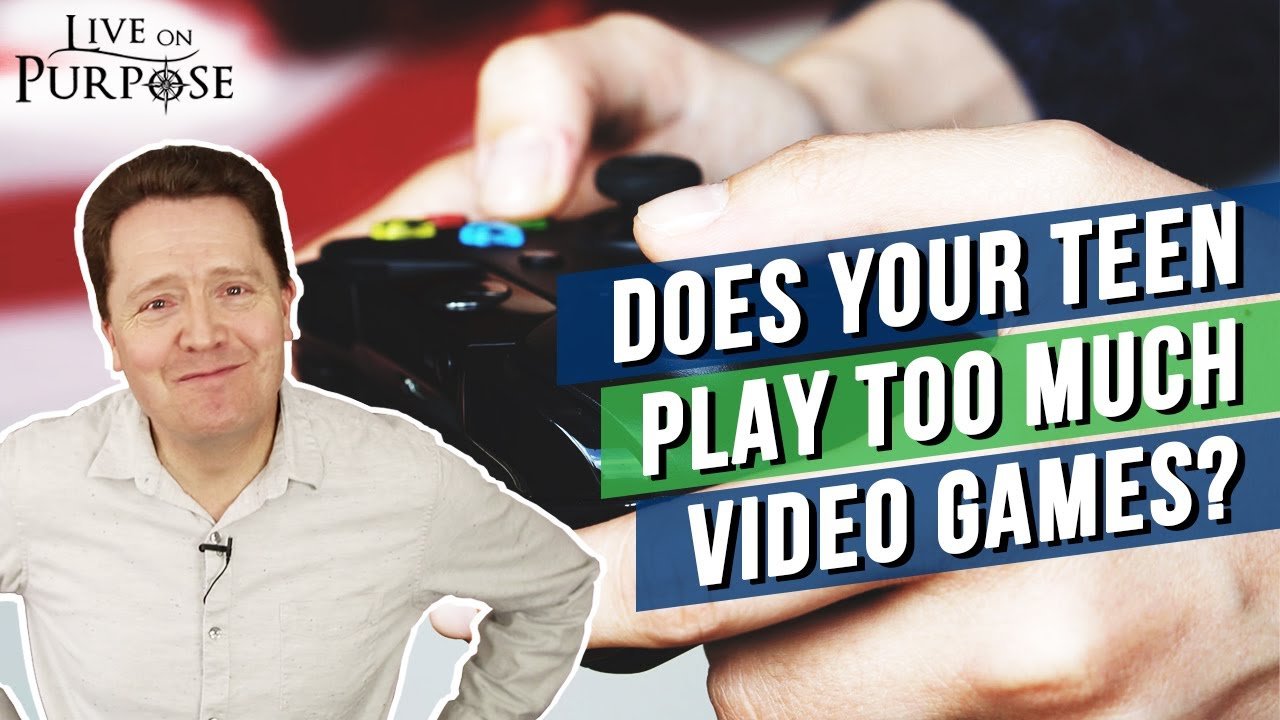Are you a parent of a teenager who enjoys playing video games? If so, you may have encountered the challenge of how to limit their gaming time. While video games can have positive effects on skills like motor skills and reaction time, research shows that excessive gaming can lead to social and behavioral problems. In this video, Dr. Paul Jenkins from Live On Purpose TV discusses different stages for effectively limiting video games with teenagers. He emphasizes the importance of finding a balance and ensuring that gaming does not take away from other productive activities that can enhance and enrich their lives. Remember, your role as a parent is to love your teen no matter what, and setting limits on video game usage can be done in a compassionate and empowering way. So, let’s explore these stages and discover effective strategies for addressing the video game issue with your teenager.
One of the primary challenges parents face is identifying the stage their teenager falls into regarding gaming behavior. Stage one is characterized by selfishness, entitlement, and resistance to cooperation. If your teen is in this stage and unwilling to cooperate with your limits, taking control of the device or access to the game becomes necessary. Stage two marks a shift towards cooperation and negotiation. Dr. Jenkins suggests engaging in open and effective communication with your teenager, discussing concerns, and establishing win-win solutions. On stage three, teenagers demonstrate responsibility, values, and ethics, making intervention minimal. To gain a better understanding of these stages and approach the video game issue effectively, Dr. Jenkins recommends exploring the Parenting Powerup, a resource created by him and Vicky. With clear criteria and enforcement, you can help your teenager find a healthy balance between video games and other activities. Remember, love is the foundation, and setting limits stems from a place of care for your teen’s overall well-being.
Understanding the Negative Effects of Video Games
Video games have become a popular form of entertainment, especially among teenagers. While there are potential benefits to playing video games, such as improving motor skills and reaction time, research has shown that excessive gaming can be linked to social and behavioral problems. As a parent, it is important to understand these negative effects and the need to limit video game time for your teenager’s well-being.
Linking video games to social and behavioral problems
While video games can provide entertainment and even educational value, excessive gaming has been associated with several negative effects on teenagers. One of the major concerns is the impact on their social skills. Spending too much time playing video games can lead to reduced time spent interacting with others in real-life social situations. This can result in social isolation and difficulty forming meaningful relationships.
Additionally, video game addiction can lead to behavioral problems. Teens who are addicted to video games may become irritable, aggressive, and have difficulty focusing on other aspects of their lives. It can also interfere with their academic performance and overall development.
The importance of limiting video game time
Given the potential negative effects of excessive gaming, it is crucial for parents to establish limits on video game time for their teenage children. By setting boundaries, you can prevent them from becoming overly dependent on video games and ensure they engage in a well-rounded range of activities. It is important to strike a balance between allowing your teen to enjoy their favorite games and ensuring they have time for other important aspects of their lives, such as schoolwork, physical activity, and socializing.
By limiting video game time, you can encourage your teenager to explore other hobbies and interests, which can contribute to their overall personal growth and development. It is essential to help them find a healthy balance and prioritize their time effectively.
Identifying Your Teen’s Stage
Understanding your teenager’s stage of development can greatly influence how you approach limiting video game time. Three stages can be identified when it comes to a teen’s behavior and mindset: selfish and entitled behavior (stage 1), cooperative behavior (stage 2), and responsible behavior (stage 3). Identifying which stage your teenager is in can guide you in implementing effective strategies to address their excessive gaming habits.
Stage 1: Selfish and entitled behavior
During stage 1, teenagers may exhibit selfish, self-centered behavior. They may be unwilling to cooperate, feel entitled, and display tantrums, arguments, and demands. It is crucial to identify whether your teen is in this stage as it determines the approach you need to take in limiting their video game time.
Stage 2: Cooperative behavior
In stage 2, teenagers start to exhibit more cooperative behavior. They are willing to negotiate and communicate, and conflicts may be resolved more easily. This stage provides an opportunity for open lines of communication with your teen, allowing you to address their excessive gaming habits and find mutually beneficial solutions.
Stage 3: Responsible behavior
At stage 3, teenagers demonstrate responsible behavior. They take initiative and have developed their own values, morals, and ethics. They require minimal intervention from parents in managing their video game time.

Stage 1: Taking Control of Device or Access
If your teenager is in stage 1, where they display selfish and entitled behavior, it is crucial to take control of the device or their access to the game. During this stage, your teen may not listen or cooperate with the limits you set. Taking control of the device or access to the game becomes necessary to establish boundaries.
While it may be challenging, you must enforce the limits you set. You may need to get creative and think of ways to control access, even when you’re not present. For example, you can remove the power cord to limit their ability to play. It is important to remember that enforcement is your responsibility as a parent, especially during stage 1 when cooperation is unlikely.
Stage 1: Establishing Clear Criteria for Regaining Access
To ensure the effectiveness of your limits, it is essential to set clear criteria for your teenager to regain access to video games. By defining specific behavior requirements, such as completing chores, homework, or demonstrating improved behavior, you provide your teen with clear expectations.
Enforcing these criteria is crucial for the effectiveness of the limits you set. If your teenager meets the established criteria, they should be rewarded with limited access to video games. However, it is important to ensure that access is earned and not given freely. Consistency is key in maintaining clear boundaries and reinforcing responsible behavior.
Stage 2: Opening Lines of Communication
Once your teenager enters stage 2, where they display more cooperative behavior, it is crucial to focus on open lines of communication. Engaging in conversations about your concerns regarding their excessive gaming habits and discussing the concept of opportunity cost can be effective strategies.
When communicating with your teenager, it is important to avoid arguments or dismissing their perspective outright. Acknowledge their preference for video games but also introduce the concept of opportunity cost. Help them understand that engaging in video games means sacrificing time for other activities, such as completing schoolwork or pursuing other hobbies. This perspective can allow them to make more informed decisions and prioritize their time effectively.
Negotiation can play a significant role during stage 2. By involving your teenager in the decision-making process and finding a win-win solution, you can foster a sense of ownership and responsibility in managing their video game time. Additionally, this approach can help reduce resistance and create a healthier dynamic between you and your teen.
Stage 3: Allowing Teen to Take Responsibility
When your teenager reaches stage 3, where they exhibit responsible behavior, it is important to celebrate their growth and development. At this stage, minimal intervention is required, as they have demonstrated a sense of responsibility and the ability to manage their video game time effectively.
By allowing your teenager to take responsibility for their video game habits, you empower them to make their own decisions and exercise self-control. It is important to trust in the values, morals, and ethics they have developed and provide them with the freedom to manage their time responsibly.
The Importance of the Parenting Powerup
Parenting can be challenging, especially when it comes to addressing excessive video game habits. To navigate these challenges effectively, it is helpful to have detailed guidance on each stage of your teenager’s development and strategies to interact effectively with them.
Vicky and I have created the parenting powerup, a resource that provides in-depth information and tools to help parents navigate the challenges of addressing excessive video game habits. This resource can assist you in understanding the different stages of your teenager’s behavior and providing you with the necessary tools to establish and enforce limits effectively.
By utilizing the parenting powerup, you can approach the issue of video game time with confidence and empower your teenager to develop a healthier relationship with gaming. The link to the parenting powerup can be found in the description below.
Conclusion
While video games can provide entertainment and some cognitive benefits, excessive gaming can have negative effects on teenagers, impacting their social skills, behavior, and overall development. As a parent, it is important to limit video game time and ensure a healthy balance between gaming and other activities.
Understanding your teenager’s stage of development allows you to implement effective strategies to address their excessive gaming habits. In stage 1, where they display selfish and entitled behavior, taking control of the device or access to the game becomes necessary. Setting clear criteria for regaining access and enforcing these criteria is essential.
In stage 2, where cooperative behavior emerges, opening lines of communication, discussing concerns, and negotiating can be effective strategies. Finally, in stage 3, it is important to celebrate responsible behavior and provide minimal intervention.
By utilizing resources such as the parenting powerup, you can approach the issue of video game time with confidence and provide your teenager with the necessary tools to develop a healthy relationship with gaming. Remember, your role as a parent is to love and support your teen, even throughout the challenges of limiting video game time.

